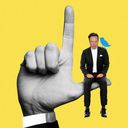The biggest losers from Elon Musk's Twitter chaos

Published Date: 7/11/2022
Source: axios.com
The Elon Musk vs. Twitter fracas has hurt almost everyone in its proximity, no matter how a Delaware judge may rule or if the two sides settle out of court. So let's rank them:
The biggest loser: Musk, who's committed more unforced errors than a toddler playing tennis against a wall.
- Best case scenario for the Tesla CEO is that all he's hurt is his reputation, and eliminated any chance he'll ever again be taken seriously when trying to buy a company not co-founded by his cousins.
- Middle ground is that he also shells out a ton of cash, possibly via a negotiated settlement. Well more than the $1 billion breakup fee, but well less than $44 billion.
- Worst case scenario is that a Delaware judge forces Musk to buy Twitter for $54.20 per share, even though he doesn't want it and might lose some of the associated financing (depending on how tight those contracts were written). And, as a kicker, the SEC also imposes penalties tied to his Twitter stock purchase disclosures.
2. Twitter employees, sitting in a prickly limbo over which they have no control.
- Their top issue is uncertainty, over the company's direction and who will be making those decisions going forward. Imagine if your employer sued to install a new boss who has screamed that he doesn't want to be your boss.
- A lot of employees also might lose money, given that Musk was offering to pay much more than Twitter shares can get on the open market. Plus, some employees have full vesting provisions on stock options grants, tied to a change of control.
3. Twitter's board, which knew it was a bad idea to get into bed with Musk but did so anyway. It's morning-after regret, multiplied by 44 billion.
- Remember, the board initially adopted defensive measures like a poison pill, but faced internal (Jack Dorsey) and external (Musk's Twitter army) pressures. Plus the threat of litigation from shareholders who wanted that $54.20 price. So it took the path of least resistance and caved.
4. Musk fanboys (and fangirls), many of whom mistook Chutes and Ladders for 3D chess.
- When Twitter's board first acted dismissively, these folks howled. How dare Twitter not take Musk seriously or suggest that his efforts could harm the company? When reporters suggested that Musk acted too impulsively, particularly in eschewing normal due diligence, we were reminded that we didn't revolutionize the auto or space industries, and thus should be ignored.
- Now, with Musk's endorsement, they're peddling a theory that Musk only walked away to spark a lawsuit that will force Twitter to reveal additional "bot" data in court.
- First, this is highly unlikely to happen. Delaware Chancery Court would be opening up a huge loophole by allowing a buyer to go on a fishing expedition after signing a binding merger agreement. Future acquirers with cold feet would jump on in.
- Second, even if the court did allow it and new disclosures validated Musk's hunch about elevated spam levels and that the error was material, what would he have gained (except maybe getting out of the deal he voluntarily proposed)? Proving that a company in which he bought nearly a 10% stake should be worth less than he paid for it? Some long game to damage the platform via which he most likes to communicate? Chaos for memes sake?
But don't worry, there are some winners: Lawyers racking up billable hours.